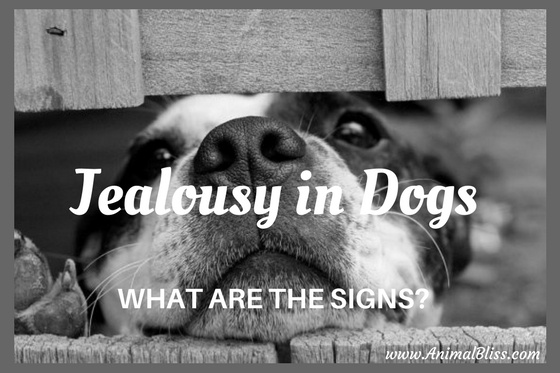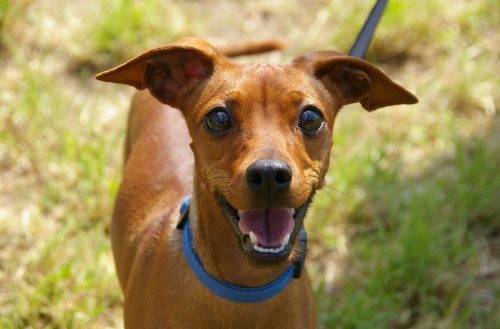Signs of Jealousy in Dogs
Dogs display their feelings in various ways, jealous-like behavior being one of the most frequently met. Jealousy in dogs may happen when our attention is directed to other animals or humans.

At Premier Pups Reviews.com, customers share funny or embarrassing moments in which their dogs act like they are jealous, displaying unwanted behaviors. In fact, we concluded that dogs want their owners’ attention and are unwilling to share it with other beings.
Jealousy in dogs suggests boredom or a desire for attention from their owners. They may feel insecure, so they need individual attention, cuddling, and some activities to keep them occupied. There are moments when dogs want their owners exclusively for themselves. There may be multiple reasons for this: a lack of resources, social conflict, stress, lack of exercise, or even genetic disposition. Other causes may be a new schedule, a new home or neighborhood, new primary caregiver, new pets in the home, new people living in the same house, or a new baby or child.
RELATED:
Tips for Safely Introducing Your Dog to New Guests
Katenna Jones, an associate applied animal behaviorist, considers that pets don’t experience jealousy in the true sense of the word. She says that pets are assertive, pushy, or they merely adopt a rude behavior to scare other pets out of the way. Thus, recent studies on dog behaviors confirmed that dogs do get jealous or envious. They tend to exhibit protective behaviors through snapping, getting between the owner and the object, pushing, touching the object or the owner when their owners displayed affectionate behaviors towards other pets.
Suzanne Hetts, applied animal behaviorist, says it cannot be determined if the feeling a pet has when he is trying to get your attention or his favorite toy back is jealousy. In most cases, it is a competitive situation where the pet is competing with another individual, human or animal, for something he wants. These types of behaviors are unhealthy and need to be eliminated.
Nine frequently met jealous-like behaviors
1. Aggression
Aggression comes in the form of biting or nibbling of the animal or person getting attention over them.
2. Peeing or pooping indoors
Going potty indoors is usually a sign of expressing their negative feelings or getting revenge for dissatisfaction. Dogs try to tell you something when they are peeing or pooping in places where they shouldn’t.
3. Paying extra attention to their owner
This behavior comes across as a pet cuddling up extra close to his owner and suddenly licking his hand or face. It is a sign of affection, and the dog is trying to get attention.
4. Pushy behavior
Jealousy in dogs sometimes presents itself through pushy behavior in the form of inhibiting another person or animal from moving freely or pushing them away. It also exhibits a desire for attention.
5. Competing with other pets
Growling, hissing, or fighting with other pets is usually seen within multi-pet households. Pets can be in continuous competition for their owners’ attention.
6. Scaring strange persons
Jealous dogs may bark, hiss, or growl aggressively when new people appear and are being greeted by their owners.
7. Performing tricks
When a dog wants his owner’s attention, he may start performing tricks.
8. Crowding their owner’s space
Dogs sometimes sit up and beg for their owners’ attention. They sit up on their hind legs.
9. Leaving the room
The tendency to withdraw is frequently met when a dog feels mad for not getting his owner’s attention.
RELATED:
How to Properly Engage Your Dog in the Training Process
Tips on Preventing Jealousy in Dogs
There are certain situations in which a little more attention makes the difference.
- Avoid giving more attention to one pet at the expense of another. The same rule applies when it comes to introducing new members to the family.
- Avoid inequalities in the amount or types of food between pets. Also, if you have multiple pets, feed them separately to avoid potential conflicts.
- If you have multiple pets, ignore them when you arrive at home, so they don’t feel they receive less attention than the others. The emotional excitement will decrease. Also, avoid petting one of them at the expense of the others.
- Train your dog to feel secure in his crate as well as outside.

How to Deal with Jealous Behaviors
When dealing with a jealous dog, follow these tips and tricks:
- Give your dog attention and praise when he behaves well.
- Don’t give your dog attention when jealous behaviors arise. Your dog may see this as a reward, and you don’t want to encourage unwanted behaviors. Instead, go out of the room and come back later.
- Involve the object of jealousy in the training practice. If the resentment is about a new member of your family, involve them with walks, meals, and playtime. Give your dog treats only if he displays a calm and obedient behavior.
- If another dog causes the jealousy, give him treats only when the dogs are together, when sitting politely or being in their beds. Your dog will associate the new dog with good things, and he will strive to impress you with his obedience skills. Also, take both of them on walks together so they can get more accustomed to each other.
- If your dog is jealous of a baby, you may offer him an object or a piece of the baby’s clothing to smell. Then, offer him some treats, and things will get easier. Be careful, and NEVER leave a dog unattended around a baby or a small child. You may want to use a leash to have better control of your dog.
- Dogs usually tend to guard resources like toys, chews, treats, or even their favorite persons. The situation escalates to aggressive behavior if some threats appear. Remove triggers and train your dog to execute specific commands so you can better handle unpleasant situations.
- Jealousy in dogs may require a need to focus on a regular training practice. Dogs that haven’t been worked with since puppy kindergarten need individual training sessions to catch up.
- Don’t forget about daily exercise and separation with crates or baby gates to better manage the dog’s access throughout the house.
- If a lot of issues are going on at once and your dog develops secondary bad behaviors, focus on just one behavior at a time. Reinforce basic desired habits.
Conclusion
Management of a dog’s behaviors helps to keep him mentally healthy and prevents unwanted situations.
~~~~~
“Most Frequent Signs of Jealousy in Dogs”
Guest Author:
Troy works as a Marketing Executive for PremierPups and Premier Pups Reviews Division. He is passionate about animals and loves to help people find the right dogs for them. In addition to reading and writing about animals and psychology, Troy enjoys spending quality time with his beloved dog.
*** Please Share ***
Most Frequent Signs of Jealousy in Dogs, How to Prevent it, and What to do about it. Share on X![]()
MY QUESTION FOR YOU:
Does your dog get jealous of other animals or people?
*** Leave your comment below. ***
(It’s just sexy!)

Peace
DISCLOSURE: Animal Bliss is a participant in the Amazon Services LLC Associates Program, an affiliate advertising program designed to provide a means for us to earn fees by linking to Amazon.com and affiliated sites.
(In other words, we’ll get a very small (teeny tiny) commission from purchases made through links on this website.)
So, go on … Don’t be shy!
Buy Something BIG and Expensive!
Thank you!
😀
[amazon_link asins=’B004LLIKVU,B073HMNXXH,B00QKSSGH0,B017STTUJM,B06XDNSX5V,B0177ONHRO,B078QP8TFW’ template=’ProductCarousel’ store=’animblis-20′ marketplace=’US’ link_id=’dd0b16fc-382f-11e8-9a45-e9cd5bf03ccd’]
😀
- 4 Tips for Maintaining Healthy Weight for Your Cat - December 20, 2019
- 8 Amazing Benefits of CBD for Dogs and Other Pets - December 12, 2019
- Kibble or Canned Pet Food? What Should Your Pet Be Eating? - December 9, 2019

My fiancé’s adult pug is causing major issues . She is acting out, using the potty in the house and her crate even when she just went potty, roaming freely around the house,demand barking when she sees my fiancé to get food,attention(which she doesn’t lack),she jumps on him ,whines,etc when we are together and he always has an excuse as to why she does anything. I had spent two years working with her when we first met getting her to heel when walking,not jumping on people,not pushing herself between us,using the potty outside and I crate trained her also which was all wonderful for about a year and a half ,until his mother and him did not support me ( think the dog should have rules) and within a month everything I worked so hard for with her just went out the window. She now is back to having no manners,constantly barking and jumping on my fiancé ,but all of the sudden ignores me unless she thinks I have food,she is pooping wherever she seees fit,and so much more. I’m to the point where it’s making me crazy and frustrated that he doesn’t understand a dog needs a routine,and manners,and that it’s something else causing her to behave like a puppy. I’m exhausted from it,and don’t know what to do. If I bring up the slightest thing about her behaviors,he gets defensive of the dog and lets her do whatever. Any suggestions?
Wow! It sounds like a madhouse over there. I’m sorry you have to go through all of this. Imagine what it must be like for your dog. 🙁 Sadly you can work with her until the cows come home, but if she’s allowed to come home and do whatever she wants, breaking all the rules, then she’s, like, “Alright! I’m free!” It definitely takes the cooperation of the household too for the training to be successful. My suggestion is to make your fiance deal with all the poop from on now. Maybe soon enough he’ll be teaching the dog to go outside. Other than that, I feel your pain.
Thank you!
My friend just got a second dog, and her old dog is not handling it well. Very jealous! She is resource guarding, which can be dangerous, especially for my friend’s kid! I told her to watch them carefully, and to seek a trainer if things don’t improve in a couple of weeks!